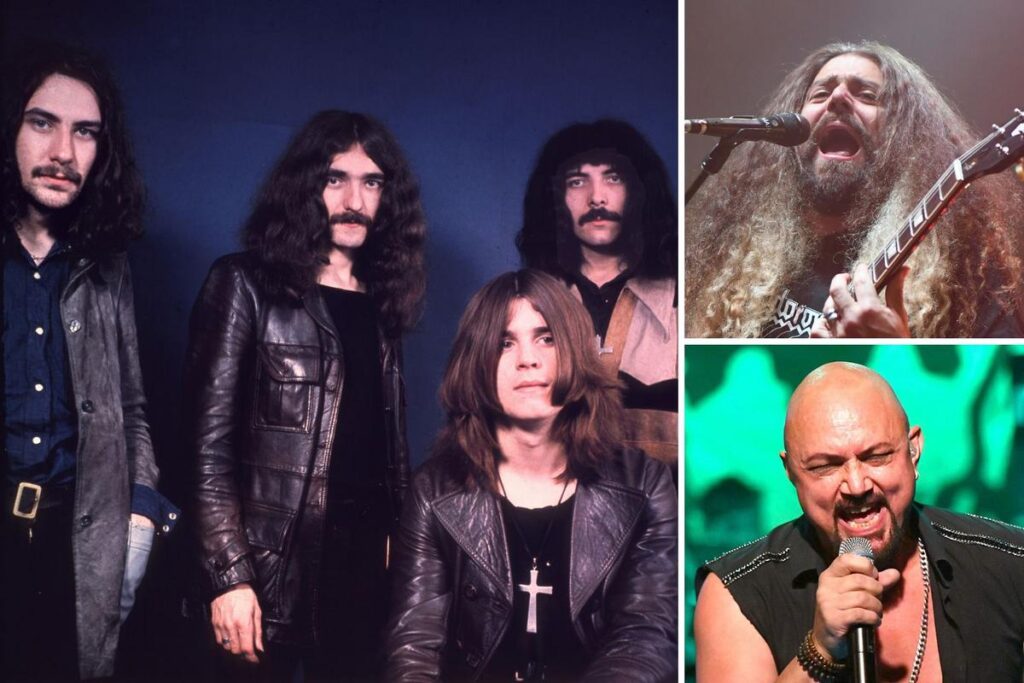Paul Natkin, Archives Photos/Getty Images
loading…

Here are the five best prog metal covers of Black Sabbath songs!
As the inventors of heavy metal – according to most genre fans and journalists, at least – Black Sabbath directly or indirectly influenced every subsection of the style. As such, and because they have hundreds of tracks, you’d have one hell of a time finding a metal (or rock) subgenre without at least one or two covers of a Black Sabbath classic.
Progressive metal is no exception. Granted, there are actually far fewer adaptions than you might expect, but enough artists within that category have put characteristic spins on Black Sabbath tunes to warrant a ranking of the five best ones.
READ MORE: The 55 Best Metal Covers of Classic Rock Hits
As always with these kinds of lists, we’re looking for groups who simultaneously retained Sabbath’s fundamental vibe and made the song their own in various ways. We’ve probably left off some of your favorite reworkings, though, so feel free to sound off in the comments about which tracks you would’ve included.
With all that said, let’s jump into the five Black Sabbath covers that most impressed us with their technical ecstasy, resourceful changes and ability to avoid sabotaging the original’s spirit!
Paul Natkin, Archives Photos/Getty Images
loading…
Recorded live at Stockholm’s Sodra Teatern in 2012, Opeth’s rendition of Master of Reality’s penultimate cut is the only Black Sabbath song they’ve ever formally covered. It released as a bonus track on 2014’s Pale Communion, and according to frontman Mikael Åkerfeldt, they’d been playing it since “the early ‘90s.”
In a nutshell, Opeth stick very closely to the Birmingham quartet’s surprisingly gentle and pastoral vision, with a bit less Moody Blues-esque psychedelic floweriness and a bit more Middle Eastern twang thanks to its marginal increase in fancy guitarwork. It’s slightly more biting and grounded (and less dreamy) as well, and it could just as easily be an Opeth original.
It’s perhaps the safest entry here, yet also one that epitomizes how the best covers are often as authentic to the initial creators as they are to the artists reimagining them.
Heaven and Hell is routinely voted as one of Black Sabbath’s strongest LPs, and explosive opener “Neon Knights” plays as large a role in that distinction as anything else in the collection. That’s why Queensrÿche had quite the task in front of them when they chose to tackle it on 2007’s appropriately named Take Cover (which was sandwiched between two of their weakest efforts: 2007’s Operation: Mindcrime II and 2009’s American Solider).
They may’ve been lacking artistically when it came to their own material during that time, but they pretty much sound as energized and focused as ever on “Neon Knights.”
It’s almost identical structurally and Geoff Tate’s soaring voice still doesn’t outdo Dio’s show-stopping performance. Even so, they do a killer job injecting their own flavors into Black Sabbath’s template with respectfulness and resourcefulness.
In that way, it’s an endearing example of a quintessential progressive metal forebear bowing down and paying homage to one of their eminent forefathers.
Given that they rarely border on straightforward heavy metal, you might not expect Coheed and Cambria to throw a Black Sabbath song into one of their trademark emo/prog rock/prog metal live sets. However, they toured with Heaven and Hell back in 2009, and they performed “Heaven and Hell” periodically during the second half of 2012.
Whereas the eponymous Side A closer of Black Sabbath’s 1980 album (their first with Ronnie James Dio replacing Ozzy Osbourne) was typically sludgy, gritty and gloomy, Coheed and Cambria pass some of that muckiness through a brighter, cleaner and more vibrant and epic filter.
Singer Claudio Sanchez’s distinctively high-pitched outcries make their version operatic, too, and although they lose the calm acoustic guitar outro, their electrifying closing jam is sufficiently awesome and idiosyncratic.
It’s not as “proggy” as some might anticipate, but it’s nonetheless a resourceful revision that wouldn’t have been too out of place on one of their early 2010s sequences.
Faroese foursome Týr are commonly credited as a power/folk/Viking metal ensemble, but they also incorporate ample amounts of progressive metal into their legendary conqueror persona. Their adaptation of “I” showcases that well by mixing the core rage and dynamic range of the Dehumanizer standout with Týr’s requisite sleek production and triumphant/motivational war-ready edge.
In a sense, their fiercer tone and multilayered arrangement is what might happen of Black Sabbath’s design was retooled for the newer God of War video games or any other recent pop culture depiction of Norse or Greek mythology.
Both instrumentally and vocally, it’s twice as adrenaline-fueled and magnificent, with the chorus sounding like it’s being sung by a dozen warriors ready to charge into battle.
Interestingly, they also covered “Stargazer” by Rainbow on the limited edition of 2011’s The Lay of Thrym (so listeners got a double dose of Viking-tinged prog metal Dio fury).
“Solitude” is among the greatest Black Sabbath ballads, so it deserves two spots on this list (especially since it gave way not only to Opeth’s traditional take but also to this bolder and richer interpretation).
Lifted from the Norwegian sextet’s sixth and latest LP – 2020’s Leaves of Yesteryear – its lusher and slower trajectory is apparent right away.
Forlorn acoustic guitar arpeggios, soothing keyboard backdrops and distressing piano notes (among other rustic/tribal tones) instantly give it a hauntingly symphonic coating. Meanwhile, Kjetil Nordhus’ tender lead vocals and evocative harmonies add to its chilling classiness.
The heart of Black Sabbath’s blueprint remains, of course, but it wouldn’t be wrong for fans of folk/goth/doom metal mainstays such as Katatonia and Borknagar to prefer Green Carnation’s execution.